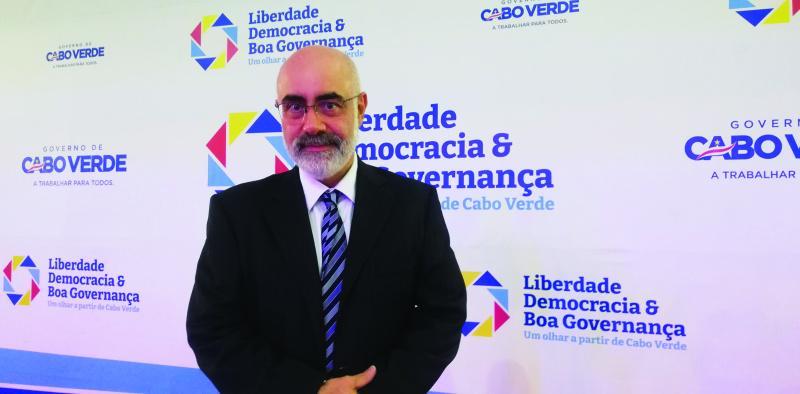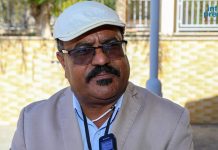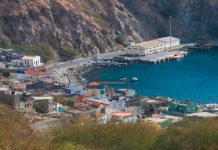By SARA ALMEIDA
Africa-Press – Cape verde. Political scientist Cláudio Couto was one of the speakers invited by the government of Cape Verde to the International Conference “Freedom, Democracy and Good Governance: A look from Cape Verde”, which took place in Sal, on the 8th and 9th. Author of a well-known YouTube channel, “Outside politics there is no salvation”, it is precisely this phrase that opens a conversation where we talk about challenges and other complex issues related to politics, anti-politics, and, above all, democracy and its institutions. The Brazilian academic, who was part of the “Democracy and Religious Freedom” panel, also summarizes his intervention, which focused on the way in which authoritarian populism has incorporated religious discourse, God and the Devil, for its own political purposes.
Why “Outside politics there is no salvation”?
There is no salvation because politics is inescapable. We live collectively, in societies that need to be governed, and if we want to live in these societies with the minimum possibility of dialogue, of finding solutions, even if they are sometimes solutions that do not please everyone, it is through politics. So, certain waves of denial of politics, of people who present themselves, not as politicians, but as something else, are not a solution to problems. In the end, either these people will play politics or they will do harm, because this denial does not allow problems to be solved. It is a scam, a way of deceiving citizens when someone tries to present themselves as non-political or tries to deny politics as a way of solving collective problems. This is why, to paraphrase the medieval phrase of the church, which said that outside the church there is no salvation, outside politics there is no salvation.
When we talk about democracy, what do you consider to be the biggest threats today, besides anti-politics?
I think that anti-politics is part of an entire scenario that even leads to the emergence of the authoritarian populisms that we have seen. Although I consider it almost redundant to talk about authoritarian populism, as it is a style of doing politics based on the idea that some individuals are the only ones qualified to represent the people, are bearers of true values, true citizenship and nationality or patriotism. This ends up turning the political game into a game that is necessarily exclusionary, in which democracy is for some, for those who are homogeneous, from a certain point of view, excluding others. So, I understand that anti-politics plays a role in this scenario and populism emerges as a major threat. This idea that it is possible to have democracy without having instruments of control, of counterweight to the way in which one governs, of how one uses power, is the great threat that we have seen become a reality in a series of countries around the world. , on all continents. Authoritarian populism is not the privilege of one continent or another, it has spread across all of them.
This growth is the fault of what or who?
I believe that this growth is, in part, the fault of the way democratic politics has been working, to the extent that people do not see themselves effectively represented in governments, in congresses, in parliaments. If this policy is made with its back to society, like a club of partners who have their own interests that have nothing to do with the function performed, it is precisely this function of representation that would allow not only to govern well, but also to express the expectations that citizenship has [does not fulfill its mission]. Those who present themselves as deniers of the system are often perceived as an attractive alternative, capable of offering a sense of true representation, even at the sacrifice of good government and public policy. A certain discourse, based on a logic of identity, beliefs, values, ends up overriding the choice of good government policies and this opens up space for adventurers, those who deny politics and who, consequently, by denying politics, deny democracy itself.
And what fault do you think the press has in this, namely, in transforming jokes into news?
There’s that famous phrase that says that when a dog bites a person it’s not news, but when a person bites a dog, it is. When politics is covered from this perspective, that every day someone bites a dog, politics begins to be perceived as a bizarre space. And it really would be if things worked like that. Of course, politics has its flaws, but it seems to me that they are much more prominent than the positive elements that occur in day-to-day politics. And, often, there are certain processes that appear to be sanitizing, to combat corruption, that do not respect due legal procedures, rights, do not even respect the principles of those who act to sanitize, and that also corrupt the system. The press is often enthusiastic about this type of action. We had the Lava Jato operation in Brazil, which seems to me to be a case like that. Years earlier in Italy, there was Operation Clean Hands. We have now seen a government falling in Portugal because the Public Ministry went after the Prime Minister’s namesake, not him, and this caused a wave of scandal in the press. The results are generally negative. In Brazil, the authoritarian government came to power, with the help of the judges who operated Operation Lava Jato and who even joined the government. We saw in Italy the emergence of populism with Berlusconi. And now we see in Portugal a system that has fragmented and is having difficulty forming a government. You don’t know how long it will last. In other words, it is a situation that generally produces much worse results than those seen before and often, when the press is not careful enough, does not separate the wheat from the chaff, and tries to normalize not only certain actions, but certain figures of the political scene, by not calling them by their due name, you run the risk of actually contributing to this type of process.
Sometimes democracy itself sabotages itself? For example, Cape Verde’s electoral code, with the most democratic of intentions, has an item that requires all candidates to be given a voice, even those with somewhat anti-constitutional ideas. How far must democracy go to avoid collapsing?
Those who use democracy to end democracy, right? It is very difficult, at first, to restrict certain speeches in advance. Prior censorship. Unless those who spout hate speech are held accountable, speeches that undermine the functioning of institutions, calling into question their proper functioning, disseminating theories that are known to be false, and that serve to undermine democracy. I think we have to have systems that create protections against this. It is the same type of debate that we see in the discussion about the regulation of social networks, which also gives space to hate speech, the dissemination of falsehoods, scientific denialism. In reality, if we don’t have some kind of instrument to limit this type of action, it’s not just freedom of expression that’s at stake and we know that’s not the case. Nobody shouts ‘fire’ in a full theater as freedom of expression – and what these practices do is a little like that: shout ‘fire’ in a full theater. Of course this will end in tragedy. I think it is necessary to have mechanisms, including at the electoral level, to avoid this. Punishing, for example, those who are known to spread falsehoods that will put the proper functioning of democracy at risk. I’ll give an example: in Brazil, recently, we had the loss of office of a deputy who, on the eve of the election, used his social networks to spread a conspiracy theory about fraud at the polls, which was false, and he knew that it was false. As a result, he was tried by the Superior Electoral Court and lost his mandate. This works exemplarily, others will think twice before doing this. I think it is the learning, including through their own mistakes, that democracies are having, that allows for improvement, an improvement in the process.
We talk about democracy and elections, but power is often in the hands of unelected technocrats, especially in supranational institutions. Does democracy suffer from this?
I think it suffers, because who are these? People don’t even know who they are. And there, again, it’s a difficult balance. None of these solutions are easy. Of course you have technical problems, this problem that I mentioned of scientific denialism goes away, but technocrats, due to their technical knowledge, are not necessarily good representatives of society. The good representatives of society are those in whom it can see good representatives, in which it sees itself in these people. Sometimes it makes mistakes, obviously, choosing those that will undermine the very functioning of democracy, but what I understand as a solution is to democratize these instances. In supranational bodies, it is more difficult, and it would be interesting if, in addition to having technocrats, you had politicians there. In some cases, you may have electoral mechanisms for this. The European Parliament seems to me to be a successful example at this level. In another case, you may be nominated for seats in these places by figures who have popular representation, who have already received popular votes, who are known to the public, because their voice in these instances has a very different weight than a technocrat who no one knows who It is. What’s more, their sensitivity, based on their experience, is also of a different type from that of the technocrat. Political problems cannot be solved with technical solutions. They require technical knowledge for certain cases, for certain dimensions of public problems, but, if you don’t have the savoir-faire, if you don’t have the knowledge of how politics is done, the tendency is disaster. And technocrats, by definition, will not have this knowledge. They may even become politicians one day, but not everyone is capable of doing that.
Speaking of the most economical part. In the management of public affairs, particularly in privatizations, where should business secrecy end and accountability begin?
It is difficult. When we talk about privatization of public services, we must necessarily have important regulatory and inspection mechanisms, because it is not just any business. It is the burden of the entrepreneur who enters into a business of this type to know that he is not in just any business. He hasn’t opened a little shop and is selling his products. He is, in reality, providing a service to society, it is a collective interest, and consequently, there will have to be much more transparency. It is not possible to have business secrecy in situations of this nature. What you have to have is exactly the opposite. In other words, I understand that regulation must mainly involve more transparency, supervision and accountability that is aimed at ensuring that the public interest always prevails over the private interest of the concessionaire or the person who acquired the privatized business. And, for this to happen, regulatory bodies in particular have to be very strong, they have to have authority and, moreover, they have to act, which is not easy either. Again, we are faced with a difficult problem because it is common that regulatory bodies themselves, by their nature, with people who know the sector, tend to be led by people who yesterday or tomorrow will be in the private sector who need to regulate: the so-called revolving door. Consequently, these people may inhibit themselves. Therefore, it is also necessary to think of more effective instruments so that there is real independence of these regulatory bodies. Or avoiding the revolving door, creating quarantines, or creating a State bureaucracy that is really specialized in that and that stays in that body, knowing the sector and that, consequently, distances itself from the private interests that it needs to regulate. And this, also for transparency. When inspection and regulation processes are more transparent, the public’s gaze tends to have a more positive effect on the functioning of these bodies.
On the issue of check and balance, the balance of powers, we know that the elections will evaluate, but they are not enough. In addition to the regulators you mentioned, what other mechanisms are essential for monitoring?
I think, in part, the opposition’s own actions. Generally, the opposition, in any democracy, whatever it may be, will point the finger at the government as the main responsible for any failure or malfunction, for the poor provision of public services. By drawing attention, it makes the government need to move because the political cost that will be reflected later in the election is a significant political cost. There is a risk of not being re-elected, there is a risk of losing representatives, whether in parliament or in local governments. So, I think the opposition-government dynamic is fundamental. The mechanics of the opposition, of being able to present a vigorous opposition – not an opposition that sabotages the government, but an opposition that effectively demands the government – is a fundamental check and balance. I think it is perhaps the main one because it is the one that most clearly has an impact on the electoral process. Then, you combine what we can call a horizontal democracy, that of checks and balances, with a vertical one, which is what makes people choose good or bad governments. I understand that this dynamic is an important complement to these bureaucratic, technocratic regulatory bodies to make these things work.
And the Public Ministry? Ultimately check and balance…
Also. It is necessary to see what the responsibilities of the Public Ministry are. It is not just acting in cases of corruption, which is obviously also your role, but often also acting in demanding good service. The Public Prosecutor’s Office also acts in this civil sphere, not just in the criminal sphere. It has the ability to demand that the rights of those who are protected by the MP, that is, citizenship, are effectively respected by service providers. And the MP, being an independent entity, also has to act in relation to governments – and again I insist, not only in the criminal sphere, but also in the civil sphere – in order to ensure that contracts are fulfilled. The main contract, obviously, is the democratic contract, but there is a second contract, which is this one, which the concessionaires, or, finally, those who are responsible for the privatized businesses have to respect, and which have to be, again, public and transparent. The inspection process itself also has to be transparent, otherwise it is a contract that no one knows about, that is written in a drawer, that is gigantic and that people obviously won’t read. But they have to understand, at least, what dynamics are operating in demanding compliance with this contract. So I think that the MP, in addition to the regulatory agencies, is a fundamental body for this, of course, in interaction with the Judiciary, because otherwise the Public Ministry does nothing.
At this conference, he participated in the Religious Freedom panel . What is the angle of your intervention?
Draw attention to how this authoritarian populism has incorporated religious discourse. As a political scientist, I like to look at empirical cases. I come from Brazil, so I will use the Brazilian case as an example, Bolsonaro, before being elected, during the electoral process, during the government and even after. He made this use, not only of religious discourse, but of religious action, even in the sense of capturing State institutions, through religious affiliations. The fight against pluralism, in the literal sense, demonizes opponents, as there is, according to this religious discourse, a fight between good and evil. Good is us, evil is our adversaries, and this is transplanted from the religious field to the political field and is an immense danger for democracy. Who could vote for the devils? Nobody. So, if you have your opponents described as true demons, as incarnations of evil, you eliminate the possible pluralism of democracy, and with it democracy itself.
Talking now about your YouTube channel “Outside Politics there is no Salvation”. How and why did this channel come about?
I started this channel during the pandemic, like many people started many things, taking advantage of remote technology mechanisms to produce some videos and audios here. I was already thinking about that, and the opportunity was created there. But, above all, I created it to respond to what I perceived at that time to be this anti-politics that was advancing very strongly, particularly in the Brazilian case.
Anti-vaccine Bolsonaro?
Exactly, anti-vaccine and anti-politics. It starts with Operation Lava Jato, which is also anti-politics, which even accused politicians of carrying out parliamentary negotiations. See the madness that can be reached when politics is criminalized in this way, and space is created for an extremist group to come to power, precisely because of this denial of politics. So, the channel’s main motivation was to create a space to discuss politics from a democratic perspective and to affirm politics as a fundamental space of human activity, and as an inescapable thing for us to ensure freedom, democracy, and social well-being. .
And how it works? I know you usually have guests.
Usually I invite. I realized that inviting people was always much more interesting. Firstly, because I don’t master all the topics, and this allowed me, every week, to have someone who mastered those topics much better than me. I could take advantage of a topic on the agenda, the current situation, to, based on academic or specialized knowledge, discuss that hot topic, in the light of that knowledge. I call political scientists, jurists, sociologists, economists, linguists, anthropologists, even psychologists. It depends a lot on the topic that needs to be addressed, but it is always someone who is either an academic, or when not strictly an academic, is a great expert on that topic. For example, I once went to discuss the indigenous issue with a colleague who is an anthropologist, even has an academic background, but who is not in academia. He works at the National Indian Foundation in Brazil. He is a public servant in this area and has a deep understanding of indigenous issues. He is an example of what a specialist would be, who can discuss this topic with great knowledge, even if it is not strictly academic knowledge.
expressodasilhas
For More News And Analysis About Cape verde Follow Africa-Press






